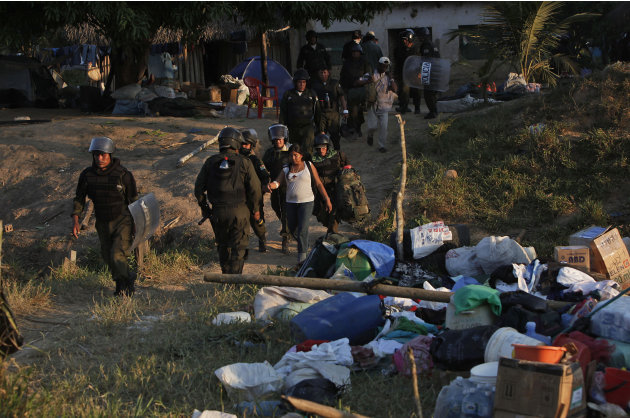Bolivian police break up anti-highway march
 Sept. 25, 2011 Associated Press
Sept. 25, 2011 Associated Press
YUCUMO, Bolivia — Bolivian police used tear gas and truncheons to break up
a march Sunday by hundreds of indigenous activists protesting plans to
build a highway they say will despoil a vast Amazon nature preserve.
Police arrested the march's leaders, hauling them away in buses. Bolivia's
national ombudsman, Rolando Villena told Erbol radio "there was excess use
of force" by police in "violating the rights of the Indians in the
protest."
The U.N.'s representative in Bolivia, Yoriko Yasukawa, called on the
government to rely on dialogue.
Witnesses including an Associated Press photographer saw about 500 police
surround protesters, including woman and children, just before dusk Sunday
and set upon them with gas and clubs.
The government had no immediate statement on the crackdown but police
officers on the scene told the AP that there were injuries on both sides,
including police struck by rocks.
About 1,000 marchers opposed to the highway had departed the eastern
lowlands provincial capital of Trinidad in mid-August and were nearing La
Paz, the capital.
The police action came a day after protesters armed with bows and arrows
briefly detained Foreign Minister David Choquehuanca, forcing him to march
with them to protect them from police and from pro-government
demonstrators.
Interior Minister Sacha Llorenti accused the protesters of "kidnapping"
Choquehuanca.
President Evo Morales, this poor landlocked nation's first indigenous
president, has insisted the highway is necessary for development but on
Sunday said he would submit the highway's fate to a regional referendum.
Morales' stubborn backing of the highway has alienated many of the core
supporters who ensured his December 2009 landslide re-election by
insisting on the 190-mile (300-kilometer) Brazil-financed highway.
Environmentalists say the highway, which will connect Brazil with Pacific
ports in Chile and Peru, will mostly benefit Brazilian commercial
interests such as logging exporters while endangering a pristine,
600-square-mile (12,000-square-kilometer) nature preserve.
The Isiboro-Secure Indigenous Territory National Park is home to 15,000
natives, who live off hunting, fishing, gathering native fruits, and
subsistence farming.
The natives fear an influx of settlers will destroy rich natural
habitats,felling trees and polluting rivers.
The road is to be built with a $415 million loan from Brazil's national
development bank, and a Brazilian company, OAS, has the green light to
begin toppling trees.
Edwin Alvarado, spokesman for Bolivia's Environmental Defense League, or
LIDEMA, has called the highway a pretext for eventual oil exploration in
the rain forest.
Under a 2009 constitution championed by Morales, the country's indigenous
groups must be consulted in advance about any projects that might affect
their traditional lands.
The law does not give them veto power, however.
___
Associated Press writer Frank Bajak contributed to this report from Lima,
Peru.



No comments:
Post a Comment